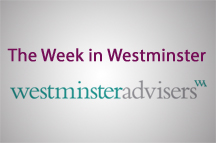 With Wednesday’s Queen’s Speech confirming the new government’s legislative programme, there has been a sense of a return to business in Westminster this week. Understandably, the contents of the first Conservative Queen’s Speech for nearly two decades has been the focus of attention over the past few days.
With Wednesday’s Queen’s Speech confirming the new government’s legislative programme, there has been a sense of a return to business in Westminster this week. Understandably, the contents of the first Conservative Queen’s Speech for nearly two decades has been the focus of attention over the past few days.
Whilst there were few genuine surprises - much had been leaked and could have been anticipated by reading the party’s election manifesto – we do now have a far clearer idea of the government’s priorities moving forward. The theme of ‘blue-collar conservatism’, present throughout the election campaign and in the immediate aftermath of the election result, remains a central focus with measures on tax, childcare and housing. That the UK is in for a period of devolutionary reform was confirmed with bills giving greater powers to Scotland and Wales whilst also setting out measures to give English cities far greater responsibilities – subject to them adopting a mayoral model.
 Partly reflecting the scale of the challenge before them, Cameron has also been quick off the mark in attempts to secure reform of Britain’s relationship with the European Union. With the commitment to holding an EU referendum in 2017 contained in the Queen’s Speech, presenting a negotiated package of reforms to their backbenchers (as well as the wider electorate) will be a crucial priority for the Conservative leadership. On this front, the Prime Minister’s tour of European cities this week – due to incorporate meetings with German, French, Dutch and Polish counterparts – provides an indication of diplomacy to come and the likely dominance of the European issue over the next 12-24 months.
Partly reflecting the scale of the challenge before them, Cameron has also been quick off the mark in attempts to secure reform of Britain’s relationship with the European Union. With the commitment to holding an EU referendum in 2017 contained in the Queen’s Speech, presenting a negotiated package of reforms to their backbenchers (as well as the wider electorate) will be a crucial priority for the Conservative leadership. On this front, the Prime Minister’s tour of European cities this week – due to incorporate meetings with German, French, Dutch and Polish counterparts – provides an indication of diplomacy to come and the likely dominance of the European issue over the next 12-24 months.
With the Queen’s Speech delivered, attention now turns to preparations for the Budget on 8th July. The tricky business of how policy commitments will be paid for at a time of reduced government spending will need to be addressed. Reports (such as today’s Times story) are already filtering through that non-ringfenced departmental budgets will be subject to additional 5 per cent cuts. All elements of government spending can expect to remain under close scrutiny over the coming months.
Labour continue their leadership contest with the party debating what direction should be taken in the wake of Miliband’s defeat. Increasingly, the contest is shaping up to be a three-way battle between Burnham, Kendall and Cooper, as declarations of support from MPs emerge.
Away from the national scene, candidates seeking to stand for the London Mayoral election are ramping up their campaigns too. For Labour in particular, the Mayoralty presents an opportunity to gain hold of an increasingly influential office and is reflected in the heavy-weights, including Tessa Jowell and Sadiq Khan, seeking to secure the party’s nomination. And it looks like George Galloway may make his political re-emergence in the capital too!














